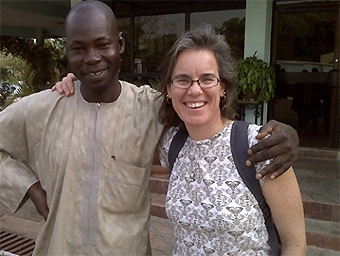Commander Noe embodies never-give-up spirit: 2015 Nurse Responder of the Year

Rebecca S. Noe (right) is with Dr. Suleiman Haladu, graduate of the Nigerian Field Epidemiology and Laboratory Training program, during an Epi-Aid of fatal poisoning among young children from Diethylene Glycol-contaminated Acetaminophen in Nigeria in 2009 (CDC photo).
On any given vacation day, you might find Commander Rebecca S. Noe in Alaska exploring the frozen, snowy peaks or hiking the hot, dusty trails at the Grand Canyon. Extreme weather and rigorous environmental challenges are what make this dual-trained scientist – both a nurse and an epidemiologist – tick.
On a workday, you may well find her on site where an environmental disaster has gripped a community — whether it is a tornado-ridden landscape, flood, chemical spill, hurricane, earthquake, or tsunami. You name it, she has likely been there as part of CDC’s disaster epidemiology efforts. When at CDC’s campus, she is often challenging hosts of organizations – including CDC — to do more, do better with producing, documenting, improving, and expediting disaster-related data. That kind of challenge might be tougher than the mountain hikes or the desert treks.
Award reflects years of dedication
Recently, Noe was awarded the Nurse Responder of the Year Award by the Commissioned Corps. “This award simply reflects the many years of dedication Rebecca has poured into ever-improving surveillance” said Adrianne Holmes, deputy chief in the Health Studies Branch of the National Center for Environmental Health where Noe is based.
“Rebecca has spent her entire career doing data collection during an emergency, determined to produce good data that can be used to expand knowledge about a current disaster and to help with future research that can help better protect communities,” Holmes said.
“Rebecca has as shown an exceptional ability to identify key intersections between various response agencies, programs, and processes that can be leveraged to advance and improve natural disaster public health response,” said Amy Wolkin, Noe’s team leader, also an epidemiologist in the Health Studies Branch.
In addition to the Electronic Death Registration System project (see main story), the award noted other highlights of Noe’s career in environmental health:
- Organized a CASPER or use “community door-to-door assessment” to explore the effectiveness of a new regional extreme cold weather warning among the residents of North Dakota in collaboration with National Weather Service and North Dakota Department of Public Health;
- Collaborated on study at Grand Canyon National Park to address the health effects of extreme heat exposure of inner canyon hikers s;
- Served as key liaison between CDC and the American Red Cross during several national disasters, including Hurricane Sandy.
- Was deployed to Liberia to assist with the Ebola epidemic.
Noe sees many more opportunities ahead for CDC and partners to redouble their efforts to serve the public both when disaster strikes and in preparation to protect others before it happens. In both her work and leisure time, she sees lots of new mountains ahead to climb.